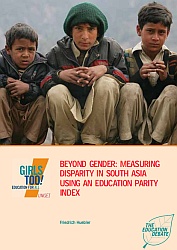 A new publication by Friedrich Huebler describes education disparity in the countries of South Asia. The report Beyond gender: Measuring disparity in South Asia using an education parity index was published by the UNICEF regional office for South Asia in its series of papers on girls' education.
A new publication by Friedrich Huebler describes education disparity in the countries of South Asia. The report Beyond gender: Measuring disparity in South Asia using an education parity index was published by the UNICEF regional office for South Asia in its series of papers on girls' education.Analysis of disparities in national education systems is often limited to gender although other dimensions of disparity are also important. The publication presents data on disparity in primary and secondary education by gender, area of residence and household wealth for countries in South Asia.
To facilitate the interpretation of complex data a newly developed Education Parity Index is introduced. The EPI combines information on disparities across different education indicators and across different groups of disaggregation. This distinguishes the EPI from existing indicators of disparity in education, including the gender parity index and the EFA development index. The EPI is flexible and can be modified according to national priorities, for example by including information on disparities between different ethnic groups.
The use of the EPI as a tool to assess education disparities is illustrated with household survey data from Afghanistan, Bangladesh, India, Nepal and Pakistan. For each country, the report describes how the EPI is calculated. In addition, national trends in education disparity from 1996 to 2006 are presented.
References
- Huebler, Friedrich. 2008. Beyond gender: Measuring disparity in South Asia using an education parity index. Kathmandu: UNICEF. (Download PDF document, 194 KB)
- UNICEF South Asia and UNGEI series of papers on girls' education
- UNICEF South Asia
- United Nations Girls' Education Initiative (UNGEI)
- Education disparity trends in South Asia
- Education data from household surveys
- EFA Development Index: Assessing progress toward Education for All
- Gender disparity in primary school
- Gender disparity in secondary school
- Caste, ethnicity, and school attendance in Nepal
- Primary and secondary school attendance in Nepal
- Nepal: trends in primary education, 1980-2004
- Secondary school attendance in Nepal, 1996-2006
- Primary school attendance in Nepal, 1996-2006
- Primary school attendance in India in 2006
- Primary school attendance by state in India
- India has 21 million children out of school
- Secondary school attendance in India in 2006
- Primary school completion in India, 1950-2000
- Educational attainment in India, 1950-2000
Permanent URL: http://huebler.blogspot.com/2008/10/epi.html
1 comment:
Pakistani Swat women and girls to suffer from complete ban on access to education:
Just as a note, the "Pakistani Taliban" in the Swat district, as of January-February 2009 (see BBC online news, go to World, and South Asia), have forced the Pakistani central government into a deal to end fighting in the area that allows Sharia law to be imposed; all Pakistan central government laws deemed to conflict with the interpretation locally of Sharia will be suspended. Already girls' schools have been and are being destroyed and parents told by extremists that their girls are not to go to school. EFA has clearly been destroyed in this region; the Convention on the Rights of the Child has effectively been torn up. This situation mirrors what ahs been happening in Afghanistan in parts of the country where the Taliban and other Islamic extremists are in control: schools have destroyed, teachers killed and even girl students killed. This was from a direct account given to me by a key programme member of an international NGO who has been working on the ground there. She also said that more NATO troops are needed if girls are to go to school, unfortunately, in this context, development is dependent on serious commitment to sustained military action. EU bilaterals and governments, take note!
- Risto F. Harma
Post a Comment